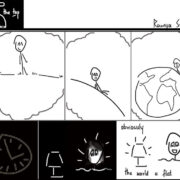Excellent interview with renowned writer Alan Moore (Watchmen, Swamp Thing, V for Vendetta, Lost Girls) on The Quietus —
On his mistrust of the Internet: “I’m practically Amish when it comes down to it. I practically mistrust any technology that came after the buggy. What I tend to think is that the internet is fine for everyone else in the world. I can see that it may have some disadvantages. In fact, I can see a few problems arising from it, but, by and large… everybody in the entire world apart from me uses the internet and seems to get on quite well with it. For my part, I don’t want to be connected to that all-pervasive kind of cyber culture any more than I want to be connected to the physical world that is around me, more than I can help it [laughs]. I’m largely a solitary creature, just by nature and by my work. That said, I venture out into town, but I very seldom leave Northampton.”
On superheroes: “I’m interested in the superhero in real life, but not the comic book version. I’ve had some distancing thoughts about them recently. I’ve come to the conclusion that what superheroes might be — in their current incarnation, at least — is a symbol of American reluctance to involve themselves in any kind of conflict without massive tactical superiority. I think this is the same whether you have the advantage of carpet bombing from altitude or if you come from the planet Krypton as a baby and have increased powers in Earth’s lower gravity. That’s not what superheroes meant to me when I was a kid. To me, they represented a wellspring of the imagination. Superman had a dog in a cape! He had a city in a bottle! It was wonderful stuff for a seven-year-old boy to think about. But I suspect that a lot of superheroes now are basically about the unfair fight. You know: people wouldn’t bully me if I could turn into the Hulk.”
On the success of Watchmen: “Initially Watchmen gained a lot of its readership because it was taking an unusual look at superheroes, but actually it was more about redefining comics than it was about redefining one particular genre. I think both me and Dave Gibbons [artist] had a lot of knowledge about that scene and we were able to take it and change it around to our advantage. And, as you say, there hasn’t been a more sophisticated comic released in the 25 years since, which I find profoundly depressing, because it was intended to be something that expanded the possibilities of comics rather than what it has apparently become — a massive psychological stumbling block that the rest of the industry has yet to find a way round.”
Read the entire interview at this location.





